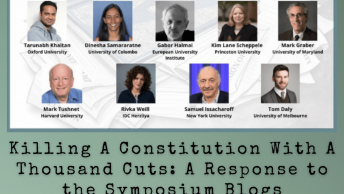About The Comparative Constitutional Law and Administrative Law Journal [“CALQ”] is an open-access online journal initiated at National Law University, Jodhpur, aiming to foster debate on...
[Ed Note – We are hosting an international blog symposium on India and Global Decline in Democracies as a part of our New Scholarship initiative. We discussed Professor Tarunabh Khaitan’s article...
Law and Other Things opened the year 2021 with a series of articles & discussions on a range of issues. Below, we are pleased to bring you an update on the blog’s activities over the month of...
In this explainer, our Reporter Shravani explains the regulatory framework for the development, approval and distribution of the COVID-19 vaccine in India. It explains the legal compliances required...
The entire legal academia and disability fraternity is shell shocked on hearing the most unfortunate news of sudden exit of Dr. Shirish Deshpande. With his sad demise, which was most untimely, the...
In this piece, the author makes a case for legislative and, more strongly, judicial recognition of the enforced disappearances of Kashmiri men, which would enable their half-widows to claim...
Call for Papers for DAKSH Report
Ed Note – We are hosting an international blog symposium on India and Global Decline in Democracies as a part of our New Scholarship initiative. We will be discussing Professor Tarunabh...
In this piece the authors look at relevant habeas corpus writ petitions filed before the Allahabad High Court to make an argument that there is no need for an anti-conversion law in Uttar Pradesh.
In this piece the authors look at relevant habeas corpus writ petitions filed before the Allahabad High Court to make an argument that there is no need for an anti-conversion law in Uttar Pradesh.
This post discusses the Occupational Safety, Health and Working Conditions Code, 2020, focusing on some of its key features as well the limitations and inconsistencies posed by it.
Ed Note – We are hosting an international blog symposium on India and Global Decline in Democracies as a part of our New Scholarship initiative. We will be discussing Professor Tarunabh...
Ed Note: As part of our New Scholarship Section, we have been inviting discussants to respond to specific articles. This Response Piece is part of a series of posts indexed here discussing the public...












